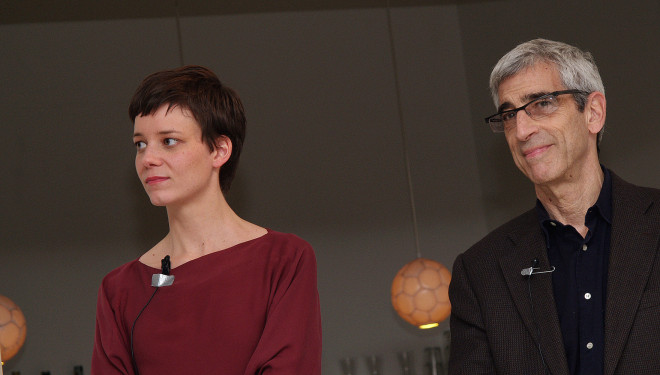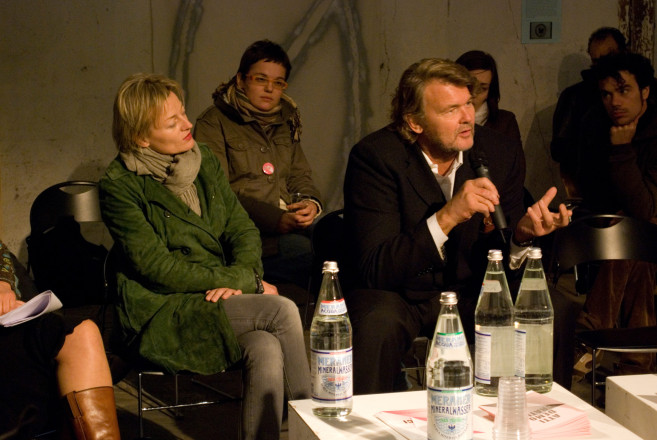Politics and creativity
Presentation of the project “Serpica Naro” by the activist group Chainworkers of Milan
In Milan, the density of fashion stores is exceeded only by its number of “Fashion victims”. Every year the clamour for new Haute Couture collections reaches its peak in the spring, despite the fact that the vast majority of people cannot possibly afford them. A group of fashion workers and activists decided to react against the fashion industry, using the sector’s own strategies. In 2004 they launched what was to be the revelation of the year within the official programme of the Milan fashion week: a “counter-parade” by an invented Japanese designer named Serpica Naro, a new design star. Fake press releases and an intense communications effort have succeeded in attracting a selected audience from the fashion shows, the press and even the police. http://serpicanaro.org/
Screening of the film “Antonio Negri – an eternal revolt” (Germany, 2004) by Andreas Pichler
Documentary film by Andreas Pichler and Alexandra Weltz, co-produced by Gebrueder Beetz Filmproduction and ZDF / Arte, SVT (Sweden) and YLE (Finland). After its first projection in Rome, the film will have its second Italian projection of the Italian translated version.
Few European intellectuals have aroused as much admiration, hatred, consensus and disapproval as Antonio Negri. Few have conducted such a contradictory and eventful life. Tracing the biography of Antonio Negri, the film tells the story of the utopia of 1968 and the birth of a global protest movement at the end of the last century.
Round table – Heritage and the present. On the radical forms of political movements in Italy
An evening of discussion with Daniele Balicco (Doctor of Research at Siena University), Elanor Colleoni (activist and Doctor of Research at the Bicocca University of Milan, and member of the Chainworkers group), Andreas Pichler (Bolzano film director). The debate will focus on the ambivalent legacy of the Italian radical political tradition regarding new forms of experimentation concerning the conflict within contemporary Italian society.
What´s on
EXHIBITION :: Binta Diaw :: Collective Practices – A Living Experience of Feeling ListenedAbout Lungomare
Lungomare, a cultural association founded in Bolzano in 2003, was created from the desire and necessity to open a space in which to share differences, experiences, opinions and desires, a space in which to make the link between cultural production and the political and social dimension. Lungomare undertakes projects that investigate and test possible relationships between design, architecture, urban planning, art and theory, the results of which are presented in different formats: public discussions, conferences, publications, exhibitions and interventions in public spaces. All these formats are characterised by the intention to interact with cultural and socio-political processes relating to the region in which Lungomare is located.
Currently Lungomare’s activities focus on long-term residency projects, a format whereby Lungomare invites guests to engage and interact within the context of South Tyrol. Lungomare’s activities are based on three principles: specific attention to the context in which the association’s projects are undertaken, the transdisciplinary approach that distinguishes these projects, and reflection on the role of Lungomare as a cultural institution in connection with the region in which it operates.
Territory
Lungomare is located at the edge of Bolzano, the capital of South Tyrol, and relates to the context in which it operates, attempting to highlight the dynamics of change. Large urbanized areas alternate with broad areas of intensive cultivation and yet others of picturesque landscape, all of which penetrate the centre of the city. The city is surrounded by mountains and this is one of the reasons why the tourism industry has become a driving force in this locality. The demographic structure of the city has been characterized for a long time by the coexistence of two populations, those speaking German and those speaking Italian. However, the social and demographic composition of Alto Adige Südtirol is changing. Migrants, including those from non-European countries are making their way to the area to settle, whilst others, including political refugees, are flowing through the region.



